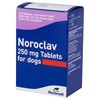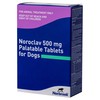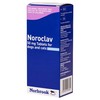Noroclav
Noroclav Tablets are indicated for the treatment of the following infections caused by beta-lactamase producing strains of bacteria sensitive to amoxicillin in combination with clavulanic acid: Skin Infections, Urinary Tract Infections, Respiratory Infections and Enteritis.
Noroclav Tablets are presented as round pink tablets with a score line so that they can be divided equally for accurate dosing.
Noroclav 250mg Tablets for Dogs
£0.46Noroclav 250mg Tablets are for the treatment of Skin Infections, Urinary Tract Infections, Respiratory Infections and Enteritis caused by beta-lactamase producing strains of bacteria that...[More info]
Noroclav 500mg Palatable Tablets for Dogs
£0.88Noroclav 500mg Tablets are for the treatment of Skin Infections, Urinary Tract Infections, Respiratory Infections and Enteritis caused by beta-lactamase producing strains of bacteria that...[More info]
Noroclav 50mg Tablets for Dogs and Cats
£0.19Noroclav 50mg Tablets are for the treatment of Skin Infections, Urinary Tract Infections, Respiratory Infections and Enteritis caused by beta-lactamase producing strains of bacteria that...[More info]
Contraindications
Do not use in animals with known hypersensitivity to penicillin or other substances of the beta-lactam group.
Do not use in rabbits, guinea pigs, hamsters or gerbils.
Do not use in animals with serious dysfunction of the kidneys accompanied by anuria and oliguria.
Do not use where resistance to this combination is known to occur.
Do not administer to horses and ruminating animals.
Special Warnings for Each Target Species
None
Special precautions for use in animals
Inappropriate use of the product may increase the prevalence of bacteria resistant to amoxicillin/clavulanic acid.
In animals with hepatic and renal failure, the dosing regimen should be carefully evaluated.
Use of the product should be based on susceptibility testing and take into account official and local antimicrobial policies. Narrow spectrum antibacterial therapy should be used for first line treatment where susceptibility testing suggests likely efficacy of this approach.
Caution is advised in the use in small herbivores other than those in section, Contraindications.
Dogs and cats diagnosed with Pseudomonas infections should not be treated with this antibiotic combination.
Special precautions to be taken by the person administering the veterinary medicinal product to animals
Penicillins and cephalosporins may cause hypersensitivity (allergy) following injection, inhalation, ingestion or skin contact. Hypersensitivity to penicillins may lead to cross-reactions to cephalosporins and vice versa. Allergic reactions to these substances may occasionally be serious.
Do not handle this product if you know you are sensitised, or if you have been advised not to work with such preparations.
Handle this product with great care to avoid exposure, taking all recommended precautions.
If you develop symptoms following exposure such as a skin rash, you should seek medical advice and show the doctor this warning. Swelling of the face, lips or eyes or difficulty with breathing are more serious symptoms and require urgent medical attention.
Wash hands after use.
Adverse Reactions (Frequency and Seriousness)
Hypersensitivity reactions unrelated to dose can occur with these agents.
Gastrointestinal symptoms (diarrhoea, vomiting) may occur after administration of the product.
Allergic reactions (e.g. skin reactions, anaphylaxia) may occasionally occur.
In case of occurrence of allergic reaction, the treatment should be withdrawn.
Use During Pregnancy, Lactation or Lay
Studies in laboratory animals have not produced any evidence of teratogenic effects.
Use only according to the benefit/risk assessment by the responsible veterinarian.
Interaction with other Medicinal Products and Other Forms of Interaction
Chloramphenicol, macrolides, sulfonamides and tetracyclines may inhibit the antibacterial effect of penicillins because of the rapid onset of bacteriostatic action. The potential for allergic cross-reactivity with other penicillins should be considered.
Penicillins may increase the effect of aminoglycosides.
Overdose (symptoms, emergency procedures, antidotes), if necessary
The product is of a low order of toxicity and is well tolerated by the oral route.
In a tolerance study in dogs a tested dose of 3 times the recommended dose of 12.5mg of the combined actives administered twice daily for 8 days did not demonstrate adverse effects.
In a tolerance study in cats a tested dose of 3 times the recommended dose of 12.5mg of the combined actives administered twice daily for 15 days did not demonstrate adverse effects.
Withdrawal Period(s)
Not applicable.
Pharmacodynamic properties
Amoxicillin is a beta-lactam antibiotic and its structure contains the beta-lactam ring and thiazolidine ring common to all penicillins. Amoxicillin shows activity against susceptible Gram-positive bacteria and Gram-negative bacteria.
Beta-lactam antibiotics prevent the bacterial cell wall from forming by interfering with the final stage of peptidoglycan synthesis. They inhibit the activity of transpeptidase enzymes, which catalyse cross-linkage of the glycopeptide polymer units that form the cell wall. They exert a bactericidal action but cause lysis of growing cells only.
Clavulanic acid is one of the naturally occurring metabolites of the streptomycete Streptomyces clavuligerus. It has a structural similarity to the penicillin nucleus, including possession of a beta-lactam ring. Clavulanic acid is a beta-lactamase inhibitor acting initially competitively but ultimately irreversibly. Clavulanic acid will penetrate the bacterial cell wall binding to both extracellular and intracellular beta-lactamases.
Amoxicillin is susceptible to breakdown by β-lactamase and therefore combination with an effective ß-lactamase inhibitor (clavulanic acid) extends the range of bacteria against which it is active to include β-lactamase producing species.
In vitro potentiated amoxicillin is active against a wide range of clinically important aerobic and anaerobic bacteria including:
Gram-positive:
•Staphylococci (including β-lactamase producing strains)
•Clostridia
•Streptococci
Gram-negative:
•Escherichia coli (including most β-lactamase producing strains)
•Campylobacter spp
•Pasteurellae
•Proteus spp
Resistance is shown among Enterobacter spp, Pseudomonas aeruginosa and methicillin-resistant Staphylococcus aureus. A trend in resistance of E. coli is reported.


